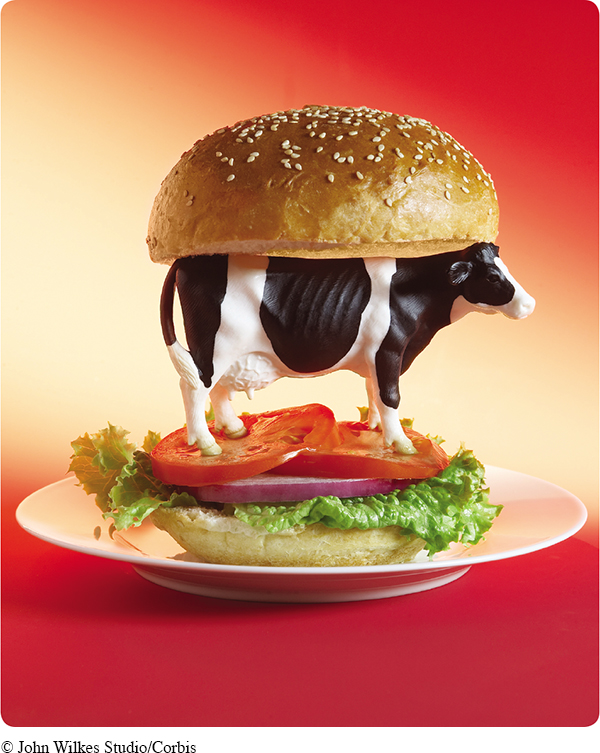See the additional resources for content and reading quizzes for this chapter.
CHAPTER22CASEBOOK Should We Eat Meat?

© John Wilkes Studio/Corbis
Page 695
As health experts increasingly worry about heart disease and obesity, this is an especially good time for Americans to evaluate the merits of meat-eating. This issue goes well beyond health and nutrition, however. According to the Vegetarian Resource Group, the over 8 million vegetarians and vegans who live in the United States become vegetarians for a variety of reasons—nutritional, ethical, environmental, and religious. In other words, their choice to forego meat is not only personal but also cultural. As Jonathan Safran Foer writes in “Let Them Eat Dog,” “Food is not rational. Food is culture, habit, craving, and identity.”
As shown by the increasing popularity of organic and locally grown food as well as by the popularity of books such as Jonathan Safran Foer’s Eating Animals (2009) and documentaries such as Food, Inc. (2008) and Fed Up (2014), our culture seems obsessed with healthy eating. Of course, dietary controversies are not new—and neither is vegetarianism, which has long been associated with certain religious traditions (Jainism and various sects of Hinduism, for example). Western philosophers from Pythagoras to Jean-Jacques Rousseau and René Descartes also advocated forms of vegetarianism. In the eighteenth and nineteenth centuries, a vegetarian diet was associated with radical politics. The English Romantic poet Percy Bysshe Shelley endorsed the practice of vegetarianism—and even blamed some of the excesses of the French Revolution on meat-eating. In the United States, vegetarianism has had strong advocates dating back to the founding of our country. Presbyterian minister and dietary reformer Sylvester Graham, for example, helped found the American Vegetarian Society in 1850. He touted the benefits of a high-fiber diet of fruits and vegetables—the staple of which was the “Graham cracker,” made of whole-wheat flour and bran. According to the zealous Graham, who attracted a sizable following, a meatless diet improved both health and personal morality.
Although the language and aims of vegetarians may have changed, many still see the choice to eat—or not eat—meat as a profoundly moral and ethical decision, not just a matter of personal choice. All the writers in this casebook agree that the choice to eat meat depends on a variety of social, environmental, and cultural factors. In an essay modeled on Jonathan Swift’s famous satire “A Modest Proposal,” Jonathan Safran Foer highlights the logical and ethical inconsistency of those who justify consuming animals such as chickens, pigs, and cows for food even though they would be horrified by killing and eating domesticated dogs and cats. Rancher Nicolette Hahn Niman addresses the connection between food production and climate change but corrects some common misperceptions about the relative environmental effects of vegetarianism and meat-eating. Daniel Payne argues that human beings are ultimately omnivores but that when making dietary choices, people must consider the realities of the way animals are raised. He argues that those who eat meat should consume only “humane” meat; in contrast, longtime vegan and activist Sunaura Taylor makes the case that the phrase humane meat is a contradiction in terms.
Page 696
